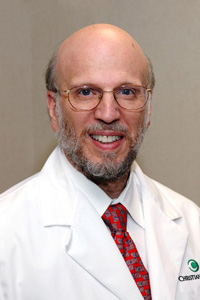Christiana Care authors present at ACC national conference


Several Christiana Care authors, including cardiology fellows, made presentations at the American College of Cardiology (ACC) Annual Scientific Session held in New Orleans, April 2-5.
“This meeting was huge for us, involving both fellows and faculty in our research presentations,” says William Weintraub, M.D., John H. Ammon Chair of Cardiology and the director of the Christiana Care Center for Outcomes Research. “We believe this kind of research, which is very much about how we improve our processes of patient care, consequently results in improved patient care.”
The ACC honored Dr. Weintraub this year with its Distinguished Service Award.
Dr. Weintraub was a co-author on four in-house studies as well as three others presented by investigators from other institutions. Two report on data from the COURAGE Trial for which he served as national co-principal investigator. A third study presents results from the National Cardiovascular Data Registry, which Dr. Weintraub helped create and now serves as a board member.
Five Christiana Care cardiology fellows presented abstracts as posters.
Kevin Copeland, D.O., presented on the incidence of a surprisingly common complication of radiation therapy for cancer, namely valve damage severe enough to require open-heart valve surgery
“As many as 5 percent of the operations done in certain age groups are due to this disorder, yet it is not widely appreciated or recognized in the medical community,” explains interventional cardiologist Andrew Doorey, M.D., senior author on the study, the first of its kind at a regional medical center. “This is a major advance in showing the high frequency of this disorder and will help raise the consciousness of physicians taking care of the increasing number of cancer survivors in our community.”
Three of the studies report outcomes from ongoing efforts to shorten time to treatment for acute heart attacks.
“With cooperation from everyone involved, we have improved our processes so that the trip from hospital door to the cath lab and emergency angioplasty is getting shorter and shorter,” explains Ehsanur Rahman, M.D., associate chief of Cardiology. Currently, so called “door-to-balloon” times at Christiana Hospital average around 70 minutes, a significant improvement over previous times and well below the 90-minute national benchmark, as shown by Daming Zhu, M.D., and co-authors.
Although time to treatment for female heart-attack patients reported around the country is longer than for men, Ali Asad, M.D., and co-authors show that door-to-balloon time improvements at Christiana Care have successfully closed this gender gap. Dr. Rahman is senior author on both of these studies.
Niksad Abraham, M.D., presented an analysis of quality assurance/surveillance data detecting a slight increase in the number of non-heart attack patients going to the cath lab for treatment. According to Dr. Doorey, the senior author, “No patients have been harmed, but we are redoubling our efforts to fully evaluate patients before doing emergency catheterizations, especially when time is critical and the stakes are high.”
Andra Popescu, M.D., presented results showing, contrary to reports in other situations, patients who are otherwise stable are not at risk for serious complications after stent placement to relieve a blocked artery when they experience a phenomenon called no reflow or slow blood flow beyond the blockage. Dr. Rahman is the senior author on this study.
Christiana Care authors also had leadership roles at the meeting. Dr. Weintraub chaired an ACC Symposium, “Wedding of the Databases NCDR & STS” and presented on ASCERT: “Early Outcomes form Linking the ACC PCI Database to Medicare Claims Data.” The Christiana Care Center for Outcomes Research (CCOR) was the analytic center for economic outcomes on the ASCERT study. He spoke on “Comparative Effectiveness Using Large Clinical Databases” and was a poster discussant for Methodological Approaches to Comparative Effectiveness Research” at the i2 Innovation in Intervention Summit. He also presented a Joint Session summary on “Quality of Care.”
CCOR Director of Operations Claudine Jurkovitz, M.D., co-chaired “Quality Outcomes of Cardiovascular Care” and was an i2 Summit poster discussant for “Outcomes After Acute Myocardial Infarction.”
Christiana Care presentations at a glance
- “Improved Systems Result in Reduced Door to Balloon Time in Both Males and Females and Gender Differences May Disappear.” Asad Ali, Yuanyuan Zhang, Dan Murphy, Angela Hoban, Susan King, Maria Albert, Angela DiSabatino, William S. Weintraub, and Ehsanur Rahman.
- “Comprehensive Strategy Including Exclusive Involvement of Interventional Cardiologists in the Decision Making Process Decreases Door-to-Balloon Time in STEMI.” Daming Zhu, Nowwar G. Mustafa, Angela Hoban, Dan Murphy, Susan King, Maria Albert, William S. Weintraub, and Ehsanur Rahman.
- “Efforts to Decrease the Door to Balloon Time Might Increase the Incidence of Unnecessary Emergency Cardiac Catheterization and Delay Appropriate Care.” Niksad Abraham, Daming Zhu, Doralisa Morrone, Angela Di Sabatino, Dan Murphy, and Andrew Doorey.
- “Frequency of Severe Valvular Disease Caused by Mediastinal Radiation Among Patients Undergoing Valve Surgery in a Regional Academic Medical Center.” Kevin A. Copeland, Vinay R. Hosmane, Claudine Jurkovitz, Paul Kolm, James Bowen, Jon F. Strasser, Michael K. Banbury, Timothy J. Gardner, William S. Weintraub, and Andrew J. Doorey.
- “No Reflow/Slow Flow during Elective Percutaneous Coronary Interventions Is Rarely Associated with Early, In-Hospital Complications.” Andra M. Popescu, Gilbert A. Leidig, Leo Marcoff, Dan Murphy, William S. Weintraub, and Ehsanur Rahman.